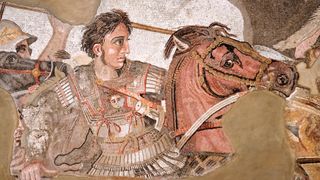
Alexander the Great built an empire that stretched from the Balkans to India in just 13 years, when he was king of Macedonia. His conquest started in Persia, where he battled King Darius III's forces in what is now Turkey, Iraq, Iran and Egypt. After defeating the Persian Empire he moved further east, conquering land in what is now Afghanistan and Pakistan. After entering what is now India his troops mutinied. Alexander then turned back but became ill and died unexpectedly in Babylon, in what is now Iraq, in 323 B.C.
When his empire fell apart after his unexpected death, his officials and generals took over parts of it, and Greek language and culture thrived across the Middle East for centuries.
But what if Alexander had been defeated by the Persians from the get-go? How would history have unfolded? Historical records indicate that this nearly happened. In the first major battle Alexander fought, at the Granicus River in Turkey, a Persian satrap (commander) named Spithridates nearly landed a blow to Alexander's head, Frank Holt, a professor emeritus of ancient history at the University of Houston, told Live Science in an email.
So what would have happened if Alexander had failed and the Persians triumphed?
Related: Why didn't Alexander the Great invade Rome?
If Alexander the Great had been defeated, we'd live in an unrecognizable world
"In short, if the Persians defeated Alexander, the world might be unrecognizable," Nikolaus Overtoom, an associate professor of history at Washington State University who has studied and written about Alexander extensively, told Live Science in an email.
He noted that Alexander's conquests and the time period afterward ushered in the "Hellenistic" age. "This was a period of immense cultural, economic, and geopolitical exchange, change, and growth, where Greek civilization had a major influence on developing societies from Spain to India," Overtoom said.
People in that region used a common language known as Koine Greek, which became the "lingua franca of the Hellenistic Age to facilitate the exchange of communication, commerce, and ideas," Overtoom said.
If Alexander had failed, would Christianity have spread?
If Alexander had been defeated, Christianity — which did not appear until more than three centuries after Alexander's death — may have died off before it could spread widely. "Koine Greek was the language used to write down and share the early teachings and thoughts of Christianity, and it was used to rapidly share the messages of Christianity across the Mediterranean and Middle East," Overtoom said.
"If there is no Hellenistic Age, then Koine Greek does not become the lingua franca of antiquity," he said. "If Koine Greek is not available to the early Christians because of this, then they have to use a less effective and well-known language for their writings and preaching, and if that is the case, then Christianity is not nearly as successful and perhaps does not become a world religion." In fact, it may not have even survived in a highly competitive intellectual and spiritual space in the first to fourth centuries, he added.
Other scholars agreed that Christianity may not have become as widespread, and Larry Tritle, a professor emeritus of history at Loyola Marymount University, said that Christianity may not have survived until present day if the Persians had defeated Alexander.

Many other changes
History would have changed in myriad other ways if Alexander had been defeated by the Persians. "A 'Pax Persica' [Persian Peace] renowned for its tolerance" likely would have prevailed from the borders of Greece to India," Holt said, as Persia would have continued to control much of the Middle East with people free to practice their own religions and cultural customs. The Persian Empire's capital, Persepolis, which Alexander's forces captured and razed, "would rival Rome and Athens as the greatest of ancient cities, its ruins one of the wonders most visited today by wide-eyed tourists," Holt added.
"There would have been no scattering of Greek settlers into cities across the east — no Alexandria in Egypt, no Kandahar, etc.," Holt said. "The so-called Hellenistic world, that extraordinary amalgam of histories and cultures, could not be created without these new settlements drawing the Greeks ever eastward in droves."
The Ptolemies, who led a dynasty in Egypt that lasted nearly three centuries, would never have taken over Egypt, and Cleopatra VII would not have been a famous queen, according to Holt.
What if Alexander the Great had been defeated by the Persians — but a bit later
If Alexander were defeated by the Persians at the Battle of Gaugamela, which took place in northern Iraq in 331 B.C., then history would still be dramatically, but not completely, altered, Holt noted. By then, Alexander had taken Egypt and founded Alexandria, and this city may have still thrived, he said.
If the defeat had come later still — such as when Alexander was fighting against Bessus, who became the self-proclaimed Persian king after Darius III was killed — then history would also have been different.
"Could Bessus have rebuilt Persepolis or regained control of Egypt and the Levant?" Holt wondered. The Levant is a land in the eastern Mediterranean and includes what is today Israel and Lebanon as well as parts of Syria, Jordan and other nearby areas.
It's also possible that a defeat by Bessus could have caused political power in the Middle East to become more fragmented than it did. If the region had remained divided, Rome might have taken advantage of that weakness both before and after it became an empire in 27 B.C. "The fragmentation of Eurasia could have accelerated the imperial expansion of Rome beyond our imagining," Holt said. "Can you picture Nero on an elephant in India?"


评论(0)